Tesco boss Dave Lewis has overseen a transformative turnaround in his five-and-a-half years at the helm. The winner of this year’s Outstanding Contribution to Retail Award tells the story of his time in charge.

Dave Lewis smiles wryly and buries his head in his right hand. Our interview hasn’t even started yet. The mere mention of this Retail Week honour – coupled with the suggestion that he is ‘the man who saved Tesco’ – has prompted him to hide away momentarily and gather his thoughts.
As he sits back upright in his chair, cheeks containing slightly more colour than they did a few moments earlier, Lewis looks genuinely uncomfortable, almost embarrassed, at being named the winner of this year’s AlixPartners Outstanding Contribution to Retail Award.
The turnaround he has led since arriving at Tesco in September 2014 makes Lewis a worthy, albeit hesitant, recipient of the prize – and he is at pains to point out exactly why the latter is the case.
“People have offered these sorts of awards at various times and I’ve always said no,” admits Lewis. “I’m happy to accept it, but only on behalf of Tesco colleagues. You’ve always got to remember, in a business like this, how important colleagues are. There are 320,000 colleagues in the UK and while you may lead a turnaround of a business, the execution of that turnaround is all about those 320,000 people.
“When we came up with that purpose of ‘serving Britain’s shoppers a little better every day’, we meant it. You can’t say that and then, when it’s inconvenient, prioritise something else”
Dave Lewis, Tesco
“The till rings 45 million times a week in Tesco and I don’t service a single one of those transactions. I think it’s very important that we remember where the actual work gets done in a retail business and I therefore always give the credit for the turnaround to the way that colleagues have responded.
“We had to become more flexible, we had to change roles. That’s meant lots of consultations, lots and lots of changes,” Lewis reflects. Just last month, Tesco revealed that changes to its in-store bakery operations would lead to more than 1,800 roles being made redundant across its supermarket portfolio. It was the latest in a series of restructuring drives Lewis has overseen across Tesco’s operations, designed to make the grocer leaner, more agile and better-equipped to serve the modern consumer.
But Lewis is full of praise for the way Tesco’s employees have responded to a period of monumental upheaval. “The reason that I deliberately call out colleagues is that they engaged with that change,” he tells Retail Week. “It could have been much more difficult, but the way that Tesco colleagues went: ‘Actually, yes, it is right for the customer and yes, it is right for the business so I’m prepared to come with you on the journey,’ is humbling. It’s truly humbling. If they hadn’t have responded in that way, we wouldn’t have been able to achieve what we have as quickly as we have.”
Trial by fire
Given Tesco’s current position, both culturally and financially, it is easy to forget just how much Britain’s biggest grocer has achieved during Lewis’ five-and-a-half years at the helm. When the former Unilever executive was parachuted in early to succeed Philip Clarke, Tesco was in turmoil – “a complete and utter basket case”, as one of the retailer’s former executives put it.
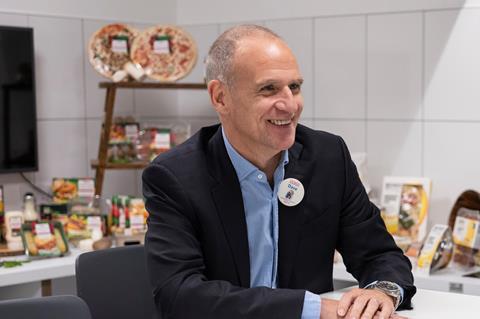
The grocer had just issued a third profit warning in the space of only eight months and slashed its dividend 75%, sparking a £1.3bn slump in its market capitalisation.
Tesco’s brand perception among shoppers in terms of its value, quality and customer service credentials had fallen through the floor amid intense competition from Aldi and Lidl. Buyers had also alienated some key suppliers through a hard-line approach to commercial negotiations.
Then there was the issue of its sprawling business empire, which had arguably distracted management from its core UK grocery operation. Earnings from its overseas divisions were declining at an alarming rate. In the year to February 22, 2014, the bottom line of its European business collapsed 32.8% to £238m. Trading profits in Asia fell 6.8% to £692m. Peripheral businesses, including the Giraffe restaurant chain and the Blinkbox streaming service – assembled during an aggressive and expensive expansion spree – were failing to drive meaningful returns on sizable investments.
It is perhaps little wonder that Clarke told the media at the time of his departure that he felt “enormous relief” to be leaving a business he had served for 40 years.
“Whatever is happening, anywhere in the country, there is a Tesco store close by. That’s the bit that’s all-consuming, but I like that – it’s one of the things I love most about retail”
Dave Lewis, Tesco
And that was before Tesco became embroiled in an accounting scandal – the £263m black hole in its P&L, later revised up to £326m, was discovered just weeks into Lewis’ tenure.
As if he wasn’t under enough scrutiny as the first Tesco chief executive to be employed from outside the business, Lewis found himself under even more intense pressure to revive the supermarket giant. With Tesco’s centenary year on the horizon in 2019, there were suddenly genuine fears that the company may not survive to celebrate the landmark occasion.
“There was a moment in September of 2014 when you could only be quite worried,” Lewis admits. “When you look at the capital structure of the business, people forget that we had £23bn of total indebtedness, we weren’t generating any cash and we’d just had an accounting scandal. At that point, it was very tricky. We had got ourselves into a place where, financially, it was really – and I mean really – tight.
“But if you step away from that and looked at the fundamental business, I believed in it. In that period between 2008 and 2014, the penetration of Tesco never went down. It’s really fascinating – for all the questions about the brand and supplier relationships, the number of people who came to a Tesco shop didn’t come down. They came slightly less frequently, and they bought a smaller basket, but the fundamental advantages of the business – that reach, that proximity, that customer connect – were still very good. My challenge was: how do we utilise that and run it in a commercially sustainable way, but with a customer-centric lens?”
Seven key moments of Lewis’ Tesco tenure
The accounting scandal
Just days into Lewis’ reign, a whistleblower exposed an accounting scandal that rocked the business to its core. The profit overstatement, which was eventually revised up to £326m, wiped £2bn off Tesco’s market cap and left Lewis with a huge task to rebuild trust and transparency.
Goodbye to Cheshunt
In January 2015, Tesco revealed plans to shut its run-down Cheshunt HQ. The move to consolidate central staff to its Welwyn Garden City base, where it opened the plush new Heart building last year, epitomised the change in company culture.
The £6.4bn loss
Tesco suffered its biggest-ever loss – and one of the largest in UK corporate history – when it slumped to a statutory loss of £6.4bn in April 2015. Lewis said the results reflected the “erosion of our competitiveness” but hailed “an important first step” in his turnaround plan as customers began to return.
Farms brands
In one of the biggest strategic plays of Lewis’ tenure, Tesco launched the entry-level Farms brands in March 2016 as part of its fightback against Aldi and Lidl. The ranges have evolved into the Exclusively at Tesco stable, which has helped win back shoppers from the discounters.
Return to profit
A year after its mammoth loss, Tesco inched back into the black with a £162m pre-tax profit. In a sign that Lewis’ turnaround plan was starting to take hold, the grocer registered its first quarter of like-for-like sales growth in the UK for three years.
Booker buy
Tesco stunned the industry in January 2017 when it agreed to buy wholesaler Booker for £3.7bn – a deal that was completed the following March. Booker has gone from strength to strength since, clocking up organic sales growth of £700m.
Return of the dividend
In a sign of confidence in its turnaround plan, Tesco reintroduced the dividend in October 2017 – the first time it had returned cash to shareholders since the accounting scandal. Tesco paid an interim dividend of 1p per share to investors.
Rightful return
Lewis attributes the rediscovery of that customer-centricity as the most crucial strategic and mindset shift he has overseen. In a thinly veiled swipe at his predecessor, he suggests Tesco had become too focused on profitability and lost sight of what made it famous in the first place – its position as the consumer champion for shoppers across Britain.
“When businesses come under pressure and the financial imperative becomes very acute – not just in retail but other industries – people start doing things only thinking about the financial imperative,” says Lewis. “I’ll never sacrifice the customer for the short-term. When we came up with that purpose of ‘serving Britain’s shoppers a little better every day’, we meant it. You can’t say that and then, when it’s inconvenient, prioritise something else.
“Tesco colleagues not only know that and are motivated by that, but they know that we will always do it. The whole idea of that purpose is that, if no one else is in the room, as long as you make a decision which is consistent with serving customers better, you’ll always be fine. Carrying that through the change and turbulence you experience, and continuing to behave that way every single day, that makes a difference.”
Maintaining that mantra has also helped Lewis make some tough decisions, not just about people, but when streamlining Tesco’s broader business portfolio to refocus on British shoppers. He has sanctioned the disposals of the Homeplus business in South Korea, Kipa in Turkey, the 20% stake in Chinese company Gain Land, and earlier this week completed the sale of its remaining Asian businesses, in Thailand and Malaysia, for £8.2bn. The Tesco group will look much different when Lewis hands the baton – slightly later than planned – to his successor Ken Murphy in October.
“The things I’m most proud of are the things that you set a direction for and allow people to think: ‘if it’s right for the customer, do it’”
Dave Lewis, Tesco
You get the sense that, when Lewis leaves Welwyn Garden City for the last time later this year, it won’t be with the “enormous relief” that Clarke took with him, but with more than a tinge of sadness. He describes life in the Tesco hot seat as an “all-consuming” but “infectious” role.
“The first three years it was literally every day, every waking moment there was something to be done,” says Lewis. “But it is infectious, as well. I can’t tell you how much I’ve enjoyed it.
“But there were times when I’d leave Cheshunt at 10.30pm, having been there for 16 hours, and thinking: ‘Bloody hell, there’s a lot going on.’ Whenever I felt like that, I would stop at a Tesco shop on the way home, walk around for a while, talk to colleagues, and would remember why it’s worth it – 320,000 people in the UK deserve for us to run Tesco in a successful, appropriate manner.
“Things are happening all the time, whether that’s good things or some challenging things. Because of the breadth of the business, there isn’t a single thing that happens on the news that doesn’t make you stop and think: ‘I wonder what Tesco’s connection to that is?’ Whatever is happening, anywhere in the country, there is a Tesco store close by. That’s the bit that’s all-consuming, but I like that – it’s one of the things I love most about retail.”
A proud legacy
Lewis keeps his cards close to his chest when asked: ‘what next?’ Given how passionately he talks about the industry, a return to retail at some point in the future may not be such a farfetched thought.
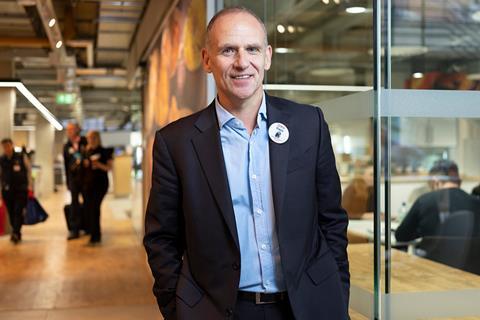
Some have suggested that a career in politics beckons for a man who has put the sustainability agenda front and centre of Tesco’s strategy through its Little Helps Plan. The retailer has a bold ambition to become a zero-carbon business by 2050; it is making radical changes on packaging, seeking sustainable sources that can be reused or recycled; and it is slashing food waste through partnerships with charities and celebrity chef Jamie Oliver, as part of a bid to ensure that no food fit for human consumption is wasted in its UK operations.
While Lewis won’t discuss his future beyond some hastily rearranged summer plans, conversation turns to his proudest moments. Perhaps the rebuilding of Tesco’s reputation in the eyes of the consumer? Maybe its £3.7bn acquisition of wholesaler Booker? Or possibly the opening of the state-of-the-art Heart building at its Welwyn campus as the embodiment of the cultural and financial shift Lewis has overseen?
“There are lots of things, and I might surprise you with my answer,” says Lewis. “What I’m proudest of is [cutting prices to cover] the tampon tax. I’m proudest of electric vehicle charging points. I’m proudest of non-visible-disability toilets and support in our business. I’m proudest of the fact we put defibrillators in all of our stores.
“And you know why I’m proudest of them all? Because I had absolutely nothing to do with them. Nobody asked my opinion, nobody asked my approval, nobody asked anything. They are all examples of people seeing a situation and saying: ‘No, no – we need to do something about this.’ The things I’m most proud of are the things that you set a direction for and allow people to think: ‘if it’s right for the customer, do it’.
“The number of times we have used those defibrillators is really scary – the letters I get from people whose lives were saved in-store because we trained a colleague to be able to use them. But that was all about colleagues realising it happens way too often and that we need to be able to help more, and then cracking on and doing it.”
Lewis’ strategic direction has allowed Tesco employees to make decisions that have saved lives. And whether he likes it or not, Lewis himself will go down in retail’s history books as ‘the man who saved Tesco’.
Opinion: Retail’s star quality shines through
- 1
- 2
- 3
 Currently reading
Currently readingInterview: Dave Lewis – ‘I didn’t save Tesco, 300,000 other people did’
- 4
- 5




















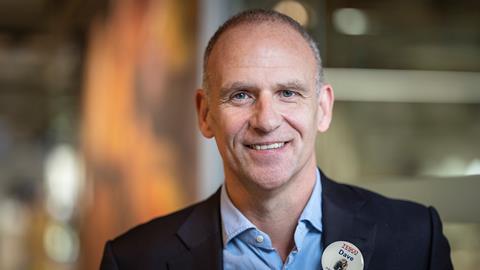
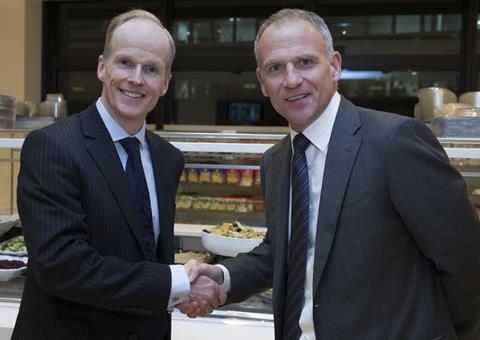








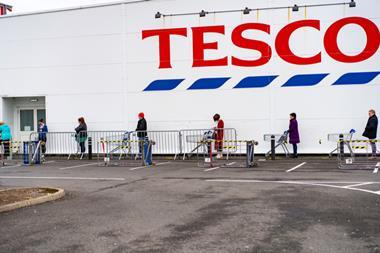
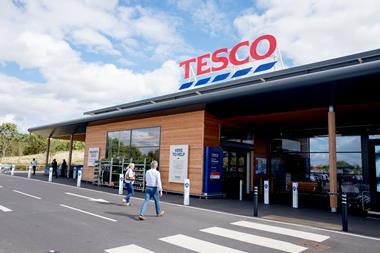
1 Reader's comment